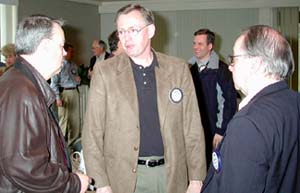|
|

Speaker/member Robin Callan talks with members of his audience after Friday’s meeting.
|
BBRC members heard about the latest innovations in the field of kidney failure treatment from our own Robin Callan, President of
Advanced Renal Technologies (ART) of Kirkland. “My Entrepreneurial Journey into Medical Device Development” was Robin’s topic. Before wading into his presentation, he wanted
the Club to know that “you people have more energy than any club I’ve ever visited!”
“For 25 years, there has been little change in the way we treat kidney failure.
Dialysis is still the basic vehicle to treat this ailment, giving 325,000 people annually a chance at an extended life. Kidney failure is a growth industry,”
said Robin. “It’s estimated that over 1 million people suffer worldwide and that rates will triple in the next ten years. It’s not the death sentence it used to be 40 years ago.”
The kidneys are vital for normal body function. [At this moment, Robin tossed
rubber replicas of ¾-size kidneys so the audience could get an idea what he’s talking about.] “The kidneys remove toxic waste from a person’s blood and is
the recycling center for the body. They help to maintain correct blood pressure and regulate dissolved solids in the blood – 350 times a day, the blood is
re-circulated through the kidneys – 1/2 cup of blood each minute. This works out to 45 gallons of waste, which is recycled and placed back in the bloodstream.
Robin explored the reasons why kidneys fail. “Hypertension, diabetes, and
diseases of the kidneys such as abuse of certain compounds like Ibuprofen are major causes. Age is also a factor, as the kidneys tend to wear out as
you grow older, and by age 80, you will have only 20% of maximum filtration. This is not as bad as it sounds, because the body’s muscle mass has been reduced also, so optimum operation is not expected.”
Renal replacement therapy is made up of two procedures: dialysis or
transplantation. “Hemodialysis (meaning blood dialysis) was pioneered by Dr. Belding Scribner of the University of Washington in the 1960’s. Before that
time, there was only desperation. Things were so bad that Life Magazine had an article that referred to ‘the Seattle committee that decides who gets
treatments-rationed care.’” By the early 70’s, dialysis was a proven acceptable therapy. The dialyzer works as an artificial kidney, with the blood pumped
through a solution called dialysate. Enter Advanced Renal Technologies.
Utilizing research led by Dr. Ahmad at the University of Washington,
commercialization of a new form of dialysate was founded in 1992. Late in 1993, Mr. Callan became the company’s first employee, and “eight years
later, I’m still the only employee!” [But, he’s worked up to be president!] In the last eight years, Robin has overseen the start-up process by learning the
technology and market, created the business plan, worked to obtain financing, helped to commence development, and begun entering the marketplace.
ART’s dialysate uses citric acid, which aids in regulating the PH of blood. “It’s
easily metabolized, is dry, inexpensive, and a known blood anti-coagulant. The company owns the patents to “Cit-D,” which has FDA approval. The new
dialysate has improved performance of dialysis treatment, reduces clotting of blood, and in 20,000 treatments, has resulted in a 70% increase in the reuse of dialysate.
The current status of ART’s efforts is the beginning of marketing of Cit-D. With
FDA approval, there are two applications approved. There are two patents pending and one application pending before the FDA. “We are seeking funds
for distribution worldwide and are also developing an acute dialysis product.’”
When asked about how people can keep from wearing out their kidneys,
Robin sounded like the broken record: “I hate to tell you this, but diet, exercise, and plenty of fluids is the recipe for healthy kidneys.” In response to
another question, he explained that the UW owns part of the company, and royalties are paid back for the research achieved in the 80’s and 90’s. “We are
currently looking for strategic partners,” invited Robin.
From a man born in Glasgow, Scotland, raised in New Jersey, and educated
with a BA in Economics, a masters in Accounting, a Juris Doctor from Seton Hall, and an LLM (tax) from New York University – and a CPA to boot – we
were privileged to learn how one of our members moves from the comfort of his early learning to become an entrepreneur in medical technology. You would
agree that Robin knows his stuff, and for the sake of millions of people on this planet, we hope ART is successful.
|

